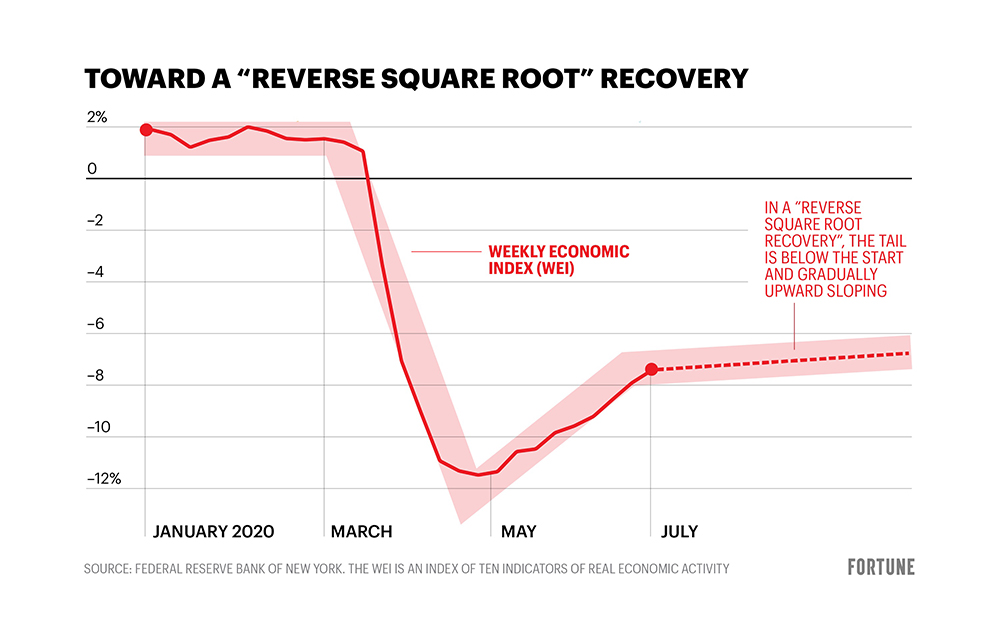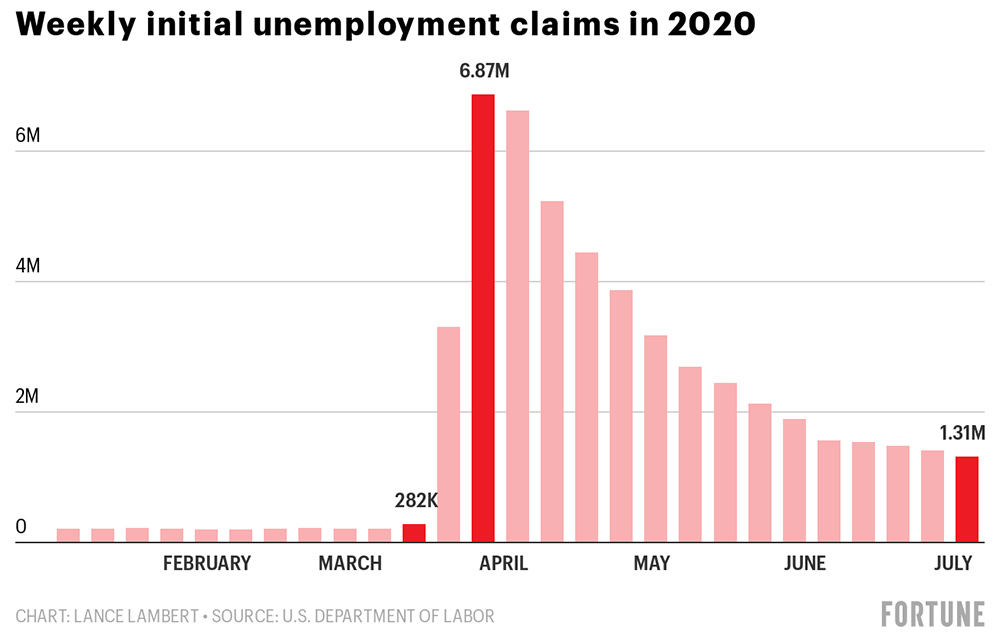還記得分析師和經(jīng)濟(jì)學(xué)家都曾說(shuō)過(guò),,我們將看到經(jīng)濟(jì)呈現(xiàn)出V形的恢復(fù)形態(tài),。
有早期跡象表明,隨著各州的重啟,,經(jīng)濟(jì)恢復(fù)迅速獲得動(dòng)力,,但有可能會(huì)因?yàn)槿佬略霾±睦^續(xù)攀升而失去后勁。
新冠病毒新增病例數(shù)在最近幾周一直在飆升,,像得州,、佛羅里達(dá)州和加州這樣的大州再次擺出了嚴(yán)陣以待的架勢(shì),它們強(qiáng)制要求對(duì)酒吧,、餐廳,、海灘等場(chǎng)所實(shí)施限令。然而,美國(guó)很多州如今都出現(xiàn)了新增病例上升的情況,。
穆迪的馬克?贊迪最近向《財(cái)富》透露,,如今經(jīng)濟(jì)出現(xiàn)V形反轉(zhuǎn)的概率為“零”。
反而,,另一個(gè)形狀可能已經(jīng)開(kāi)始顯現(xiàn),。

德意志銀行高級(jí)美國(guó)經(jīng)濟(jì)師布雷特?萊恩在數(shù)月前提出了“倒開(kāi)方符號(hào)”形狀的經(jīng)濟(jì)恢復(fù)趨勢(shì),而且他并非是唯一提出這個(gè)理論的人,。
萊恩對(duì)《財(cái)富》雜志說(shuō):“這一點(diǎn)涉及我們長(zhǎng)期以來(lái)強(qiáng)調(diào)的一件事情,,也就是它不會(huì)是一個(gè)直線(xiàn)式、一成不變的恢復(fù)過(guò)程,,而且不會(huì)一直處于上揚(yáng)狀態(tài),。”確實(shí),,萊恩在6月初就對(duì)《財(cái)富》雜志說(shuō),,他認(rèn)為經(jīng)濟(jì)恢復(fù)有可能會(huì)呈現(xiàn)出“逆向開(kāi)方符號(hào)”的形狀。他描述說(shuō),,“這個(gè)形狀也就是其尾部會(huì)低于起點(diǎn),,并逐漸上揚(yáng)?!?/p>
確實(shí),,數(shù)據(jù)越來(lái)越喜人。失業(yè)率從4月份和5月份令人頭痛的14.7%和13.3%降至6月的11.1%,。消費(fèi)支出5月出現(xiàn)了明顯改善,,躍增至8.2%(而前兩月則是大幅下跌)。萊恩指出,,銷(xiāo)售額因一次性刺激補(bǔ)助金而“臨時(shí)得到提振”,。
與此同時(shí),每周的失業(yè)救助金申領(lǐng)已連續(xù)14周下滑,,但在過(guò)去16周依然頑固地處于100萬(wàn)人以上的水平,。

如今,正是這種慢節(jié)奏的經(jīng)濟(jì)恢復(fù)(這一點(diǎn)在每周失業(yè)救助金申領(lǐng)數(shù)據(jù)中體現(xiàn)的很明顯)讓一些分析師感到擔(dān)憂(yōu),。金融網(wǎng)站Bankrate.com高級(jí)經(jīng)濟(jì)分析師馬克?漢姆里克在周四寫(xiě)道:“新冠疫情最近在一些州有所抬頭,,有關(guān)經(jīng)濟(jì)能夠以可持續(xù)的方式成功加速重啟的希望成為了泡影。這一現(xiàn)象也引發(fā)了人們對(duì)經(jīng)濟(jì)反彈的擔(dān)憂(yōu),?!?/p>
在審視這些報(bào)告時(shí),德意志銀行的萊恩卻在思考“為什么[失業(yè)率和5月的消費(fèi)支出]會(huì)有所好轉(zhuǎn),,而且結(jié)論依然是,,毫無(wú)疑問(wèn),這里仍存在風(fēng)險(xiǎn),而且現(xiàn)在看來(lái)這些風(fēng)險(xiǎn)似乎已經(jīng)結(jié)束,?!?/p>
什么可能阻礙增長(zhǎng)
經(jīng)濟(jì)的恢復(fù)上方籠罩著一朵黑云:美國(guó)一些大州如今因新增病例的抬頭而重新開(kāi)始實(shí)施限令,但這些州都是美國(guó)的GDP貢獻(xiàn)大戶(hù),。美國(guó)經(jīng)濟(jì)分析局稱(chēng),,德州、佛羅里達(dá)州和加州貢獻(xiàn)了全美約三分之一的GDP,。
此外,,美國(guó)銀行最近撰寫(xiě)的一篇報(bào)道稱(chēng),盡管最初的經(jīng)濟(jì)恢復(fù)看起來(lái)像是那個(gè)充滿(mǎn)希望的“V形”,,但該銀行的經(jīng)濟(jì)師在文中稱(chēng):“當(dāng)新增病例數(shù)達(dá)到頂峰時(shí),,我們認(rèn)為約半個(gè)美國(guó)都將受到影響。由于半個(gè)國(guó)家在緩慢地重啟,,而半個(gè)國(guó)家在緩慢地關(guān)閉,,經(jīng)濟(jì)的整體走勢(shì)可能會(huì)趨平?!?/p>
然而在萊恩看來(lái),,這并不意味著一些州的經(jīng)濟(jì)活動(dòng)受到了沖擊就會(huì)把整個(gè)經(jīng)濟(jì)拖入負(fù)增長(zhǎng)和負(fù)產(chǎn)出的深淵,一些州新增病例的攀升并不一定會(huì)成為整個(gè)國(guó)家經(jīng)濟(jì)恢復(fù)的喪鐘,。
這是因?yàn)?,就像高盛?jīng)濟(jì)師周四在紀(jì)要中寫(xiě)的那樣:“盡管風(fēng)險(xiǎn)有所增加,但我們有不少理由認(rèn)為,,美國(guó)可能沒(méi)有必要再度大規(guī)模地實(shí)施封鎖令?!边@些原因包括,,有初期數(shù)據(jù)顯示,陽(yáng)光帶的多個(gè)州(例如亞利桑那州和德州)將提升口罩的使用量,,而且“實(shí)施大規(guī)模封鎖的門(mén)檻似乎比3月份要高得多”,。不過(guò),高盛還指出,,“風(fēng)險(xiǎn)明顯依然存在,,也不能排除進(jìn)一步封鎖的可能性?!?/p>
即便在未來(lái)幾周酒吧和餐廳依然對(duì)外營(yíng)業(yè),,像萊恩這樣的人會(huì)看到,“哪怕州政府沒(méi)有強(qiáng)制實(shí)施相關(guān)規(guī)定,,但消費(fèi)者基本上會(huì)自行規(guī)范自身的行為,。”他說(shuō),這一直是人們擔(dān)心的主要問(wèn)題:即便各州不會(huì)放任消費(fèi)者肆意消費(fèi),,但出于對(duì)病毒的恐懼,,這類(lèi)活動(dòng)在各州正式下達(dá)關(guān)停令之前也可能會(huì)因消費(fèi)者自身的意愿而有所減少。
像萊恩這樣的經(jīng)濟(jì)師提到了另外兩個(gè)因素,,它們可能會(huì)阻礙最近從數(shù)據(jù)中看到的這種經(jīng)濟(jì)快速反彈現(xiàn)象:萊恩說(shuō),,第一,“很明顯的一點(diǎn)在于,,政府提供的大規(guī)模財(cái)政支持,,包括[刺激性]救助金,在5月份為零售行業(yè)的銷(xiāo)售業(yè)績(jī)提供了支撐,,但這類(lèi)支撐在未來(lái)幾個(gè)月將逐漸消失,。”萊恩說(shuō)第二個(gè)風(fēng)險(xiǎn)在于:如果每周額外600美元的失業(yè)救助金無(wú)法獲得延期,,那么就將在7月底到期,。他說(shuō):“這確實(shí)是個(gè)問(wèn)題?!?/p>
再透露一個(gè)有趣的小道新聞,。萊恩指出,谷歌Trends上對(duì)“失業(yè)福利”詞條的搜索數(shù)量再次提升,,而且他自己也在密切關(guān)注失業(yè)救助金申領(lǐng)和失業(yè)報(bào)告(主要是臨時(shí)而非是永久性的離職),。最新的失業(yè)報(bào)告顯示,盡管工作崗位在6月有所恢復(fù),,但永久性裁員的數(shù)量增至290萬(wàn),。
消費(fèi)支出明顯已經(jīng)走出了危機(jī)的低谷(3月和4月分別下降了6.6%和12.6%),5月份出現(xiàn)了激增,。但萊恩謹(jǐn)慎地認(rèn)為,,這些在未來(lái)可能保持積極走向的數(shù)字或許亦無(wú)法給那些受影響最嚴(yán)重的地區(qū)帶來(lái)提振作用。
他說(shuō):“從環(huán)比角度來(lái)講,,這些數(shù)字真不錯(cuò),。”萊恩稱(chēng),,德意志銀行預(yù)測(cè)第三季度真實(shí)消費(fèi)支出將出現(xiàn)10.5%的年化增長(zhǎng),,然而,“別忘了,,在這個(gè)10.5%的增幅中,,醫(yī)療的貢獻(xiàn)占了最大份額?!彼f(shuō):“盡管醫(yī)療行業(yè)的增速會(huì)更快,,但餐廳和酒店的恢復(fù)則需要很長(zhǎng)的時(shí)間,。不幸的是,后者才是勞動(dòng)力市場(chǎng)的主陣營(yíng),,也是重災(zāi)區(qū),。”
然而,,疫情前所未有的不確定性意味著任何推測(cè)都難以成為定論,。但萊恩表示:“對(duì)于那些此前曾認(rèn)為下半年經(jīng)濟(jì)增速會(huì)更快的人來(lái)說(shuō),如今他們可能想的是,,‘好吧,,可能還是比我之前想的要慢一些?!保ㄘ?cái)富中文網(wǎng))
譯者:Feb
還記得分析師和經(jīng)濟(jì)學(xué)家都曾說(shuō)過(guò),,我們將看到經(jīng)濟(jì)呈現(xiàn)出V形的恢復(fù)形態(tài)。
有早期跡象表明,,隨著各州的重啟,,經(jīng)濟(jì)恢復(fù)迅速獲得動(dòng)力,但有可能會(huì)因?yàn)槿佬略霾±睦^續(xù)攀升而失去后勁,。
新冠病毒新增病例數(shù)在最近幾周一直在飆升,,像得州、佛羅里達(dá)州和加州這樣的大州再次擺出了嚴(yán)陣以待的架勢(shì),,它們強(qiáng)制要求對(duì)酒吧,、餐廳、海灘等場(chǎng)所實(shí)施限令,。然而,,美國(guó)很多州如今都出現(xiàn)了新增病例上升的情況。
穆迪的馬克?贊迪最近向《財(cái)富》透露,,如今經(jīng)濟(jì)出現(xiàn)V形反轉(zhuǎn)的概率為“零”,。
反而,另一個(gè)形狀可能已經(jīng)開(kāi)始顯現(xiàn),。
德意志銀行高級(jí)美國(guó)經(jīng)濟(jì)師布雷特?萊恩在數(shù)月前提出了“倒開(kāi)方符號(hào)”形狀的經(jīng)濟(jì)恢復(fù)趨勢(shì),而且他并非是唯一提出這個(gè)理論的人,。
萊恩對(duì)《財(cái)富》雜志說(shuō):“這一點(diǎn)涉及我們長(zhǎng)期以來(lái)強(qiáng)調(diào)的一件事情,,也就是它不會(huì)是一個(gè)直線(xiàn)式、一成不變的恢復(fù)過(guò)程,,而且不會(huì)一直處于上揚(yáng)狀態(tài),。”確實(shí),,萊恩在6月初就對(duì)《財(cái)富》雜志說(shuō),,他認(rèn)為經(jīng)濟(jì)恢復(fù)有可能會(huì)呈現(xiàn)出“逆向開(kāi)方符號(hào)”的形狀,。他描述說(shuō),“這個(gè)形狀也就是其尾部會(huì)低于起點(diǎn),,并逐漸上揚(yáng),。”
確實(shí),,數(shù)據(jù)越來(lái)越喜人,。失業(yè)率從4月份和5月份令人頭痛的14.7%和13.3%降至6月的11.1%。消費(fèi)支出5月出現(xiàn)了明顯改善,,躍增至8.2%(而前兩月則是大幅下跌),。萊恩指出,銷(xiāo)售額因一次性刺激補(bǔ)助金而“臨時(shí)得到提振”,。
與此同時(shí),,每周的失業(yè)救助金申領(lǐng)已連續(xù)14周下滑,但在過(guò)去16周依然頑固地處于100萬(wàn)人以上的水平,。
如今,,正是這種慢節(jié)奏的經(jīng)濟(jì)恢復(fù)(這一點(diǎn)在每周失業(yè)救助金申領(lǐng)數(shù)據(jù)中體現(xiàn)的很明顯)讓一些分析師感到擔(dān)憂(yōu)。金融網(wǎng)站Bankrate.com高級(jí)經(jīng)濟(jì)分析師馬克?漢姆里克在周四寫(xiě)道:“新冠疫情最近在一些州有所抬頭,,有關(guān)經(jīng)濟(jì)能夠以可持續(xù)的方式成功加速重啟的希望成為了泡影,。這一現(xiàn)象也引發(fā)了人們對(duì)經(jīng)濟(jì)反彈的擔(dān)憂(yōu)?!?/p>
在審視這些報(bào)告時(shí),,德意志銀行的萊恩卻在思考“為什么[失業(yè)率和5月的消費(fèi)支出]會(huì)有所好轉(zhuǎn),而且結(jié)論依然是,,毫無(wú)疑問(wèn),,這里仍存在風(fēng)險(xiǎn),而且現(xiàn)在看來(lái)這些風(fēng)險(xiǎn)似乎已經(jīng)結(jié)束,?!?/p>
什么可能阻礙增長(zhǎng)
經(jīng)濟(jì)的恢復(fù)上方籠罩著一朵黑云:美國(guó)一些大州如今因新增病例的抬頭而重新開(kāi)始實(shí)施限令,但這些州都是美國(guó)的GDP貢獻(xiàn)大戶(hù),。美國(guó)經(jīng)濟(jì)分析局稱(chēng),,德州、佛羅里達(dá)州和加州貢獻(xiàn)了全美約三分之一的GDP,。
此外,,美國(guó)銀行最近撰寫(xiě)的一篇報(bào)道稱(chēng),盡管最初的經(jīng)濟(jì)恢復(fù)看起來(lái)像是那個(gè)充滿(mǎn)希望的“V形”,,但該銀行的經(jīng)濟(jì)師在文中稱(chēng):“當(dāng)新增病例數(shù)達(dá)到頂峰時(shí),,我們認(rèn)為約半個(gè)美國(guó)都將受到影響。由于半個(gè)國(guó)家在緩慢地重啟,,而半個(gè)國(guó)家在緩慢地關(guān)閉,,經(jīng)濟(jì)的整體走勢(shì)可能會(huì)趨平,。”
然而在萊恩看來(lái),,這并不意味著一些州的經(jīng)濟(jì)活動(dòng)受到了沖擊就會(huì)把整個(gè)經(jīng)濟(jì)拖入負(fù)增長(zhǎng)和負(fù)產(chǎn)出的深淵,,一些州新增病例的攀升并不一定會(huì)成為整個(gè)國(guó)家經(jīng)濟(jì)恢復(fù)的喪鐘。
這是因?yàn)?,就像高盛?jīng)濟(jì)師周四在紀(jì)要中寫(xiě)的那樣:“盡管風(fēng)險(xiǎn)有所增加,,但我們有不少理由認(rèn)為,美國(guó)可能沒(méi)有必要再度大規(guī)模地實(shí)施封鎖令,?!边@些原因包括,有初期數(shù)據(jù)顯示,,陽(yáng)光帶的多個(gè)州(例如亞利桑那州和德州)將提升口罩的使用量,,而且“實(shí)施大規(guī)模封鎖的門(mén)檻似乎比3月份要高得多”。不過(guò),,高盛還指出,,“風(fēng)險(xiǎn)明顯依然存在,也不能排除進(jìn)一步封鎖的可能性,?!?/p>
即便在未來(lái)幾周酒吧和餐廳依然對(duì)外營(yíng)業(yè),像萊恩這樣的人會(huì)看到,,“哪怕州政府沒(méi)有強(qiáng)制實(shí)施相關(guān)規(guī)定,,但消費(fèi)者基本上會(huì)自行規(guī)范自身的行為?!彼f(shuō),,這一直是人們擔(dān)心的主要問(wèn)題:即便各州不會(huì)放任消費(fèi)者肆意消費(fèi),但出于對(duì)病毒的恐懼,,這類(lèi)活動(dòng)在各州正式下達(dá)關(guān)停令之前也可能會(huì)因消費(fèi)者自身的意愿而有所減少,。
像萊恩這樣的經(jīng)濟(jì)師提到了另外兩個(gè)因素,它們可能會(huì)阻礙最近從數(shù)據(jù)中看到的這種經(jīng)濟(jì)快速反彈現(xiàn)象:萊恩說(shuō),,第一,,“很明顯的一點(diǎn)在于,政府提供的大規(guī)模財(cái)政支持,,包括[刺激性]救助金,,在5月份為零售行業(yè)的銷(xiāo)售業(yè)績(jī)提供了支撐,但這類(lèi)支撐在未來(lái)幾個(gè)月將逐漸消失,?!比R恩說(shuō)第二個(gè)風(fēng)險(xiǎn)在于:如果每周額外600美元的失業(yè)救助金無(wú)法獲得延期,,那么就將在7月底到期,。他說(shuō):“這確實(shí)是個(gè)問(wèn)題,。”
再透露一個(gè)有趣的小道新聞,。萊恩指出,,谷歌Trends上對(duì)“失業(yè)福利”詞條的搜索數(shù)量再次提升,而且他自己也在密切關(guān)注失業(yè)救助金申領(lǐng)和失業(yè)報(bào)告(主要是臨時(shí)而非是永久性的離職),。最新的失業(yè)報(bào)告顯示,,盡管工作崗位在6月有所恢復(fù),但永久性裁員的數(shù)量增至290萬(wàn),。
消費(fèi)支出明顯已經(jīng)走出了危機(jī)的低谷(3月和4月分別下降了6.6%和12.6%),,5月份出現(xiàn)了激增。但萊恩謹(jǐn)慎地認(rèn)為,,這些在未來(lái)可能保持積極走向的數(shù)字或許亦無(wú)法給那些受影響最嚴(yán)重的地區(qū)帶來(lái)提振作用,。
他說(shuō):“從環(huán)比角度來(lái)講,這些數(shù)字真不錯(cuò),?!比R恩稱(chēng),德意志銀行預(yù)測(cè)第三季度真實(shí)消費(fèi)支出將出現(xiàn)10.5%的年化增長(zhǎng),,然而,,“別忘了,在這個(gè)10.5%的增幅中,,醫(yī)療的貢獻(xiàn)占了最大份額,。”他說(shuō):“盡管醫(yī)療行業(yè)的增速會(huì)更快,,但餐廳和酒店的恢復(fù)則需要很長(zhǎng)的時(shí)間,。不幸的是,后者才是勞動(dòng)力市場(chǎng)的主陣營(yíng),,也是重災(zāi)區(qū),。”
然而,,疫情前所未有的不確定性意味著任何推測(cè)都難以成為定論,。但萊恩表示:“對(duì)于那些此前曾認(rèn)為下半年經(jīng)濟(jì)增速會(huì)更快的人來(lái)說(shuō),如今他們可能想的是,,‘好吧,,可能還是比我之前想的要慢一些?!保ㄘ?cái)富中文網(wǎng))
譯者:Feb
Remember when analysts and economists were saying we'd see a V-shaped recovery? They may be rethinking that thesis now.
There are early indicators that the recovery, which quickly gained traction as states started reopening, may be losing steam as cases continue spike across the country.
New cases of the coronavirus have skyrocketed in recent weeks, hitting a record of roughly 60,000 new cases on July 9. Big states like Texas, Florida, and California, are now battening down the hatches once more, by reimposing restrictions for bars, restaurants, beaches, and more. But cases of the virus are now on the rise in many states.
Moody's Mark Zandi recently told Fortune there's a "zero chance" of a V-shaped recovery now.
Instead, another shape may be, well, taking shape.
Deutsche Bank senior U.S. economist Brett Ryan was among those who predicted a "reverse square root symbol" shaped recovery months ago.
"This speaks to what we’ve been saying for a long time, which is that this is not going to be a straight line, lock-step recovery, up and up and up. It’s going to have some bumps along the road," Ryan tells Fortune. Indeed, Ryan told Fortune in the beginning of June that he thought a reverse square root symbol recovery was likely, "whereby the tail is below the start and gradually upward sloping," as he described it.
True, the data has been improving. Unemployment fell from a heady 14.7% in April and 13.3% in May to 11.1% in June. Consumer spending came in much-improved in May, jumping to 8.2% (off of two months of massive drops). Ryan points out the sales were "boosted temporarily" by one-time stimulus checks.
Weekly jobless claims, meanwhile, have fallen for the past 14 consecutive weeks, but have remained stubbornly above a whopping 1 million per week for the last 16 consecutive weeks.
Now it's the slowing pace of recovery (notable in data like weekly unemployment claims) that is worrisome to some analysts. "As the COVID-19 outbreak has recently intensified in some states, hopes for an accelerated, sustained, and successful reopening of the economy have hit roadblocks," Bankrate.com senior economic analyst Mark Hamrick wrote Thursday. "This raises concern about the economy’s rebound."
And when examining those reports, Deutsche's Ryan instead looked into "exactly why perhaps [unemployment and May consumer spending] were better, and the conclusion remains that there are definitely still risks and it seems like those risks are now playing out," he said.
What might hamper growth
One dark cloud hanging over the overall recovery: Some of the big states now reimposing restrictions amid rising case counts are among the top GDP contributors in the country: Texas, Florida, and California make up roughly one third of the nation's GDP, according to the U.S. Bureau of Economic Analysis.
What's more, Bank of America recently wrote in a report that while the initial bounce looked like that hopeful V, "By the time the growth in the virus peaks, we assume roughly half of the country will be impacted. With half of the country slowly opening and half slowly closing, the economy could flatten out overall," economists at the bank wrote.
That doesn't mean a hit to activity in some of these states will veer the economy back into negative growth and output, Ryan believes, and spiking cases in some states isn't necessarily a death-knell for the nation's recovery at large.
That's because, as economists at Goldman Sachs wrote in a note Thursday, "While the risks have increased, we see several reasons why renewed broad lockdowns may not be needed," including that early data suggests states in the Sun Belt (like Arizona and Texas) are increasing mask usage, and that "the bar for broad lockdowns appears significantly higher" than it was in March. But the firm also points out that "risks clearly remain, and further lockdowns cannot be ruled out."
Even if the bars remained open and the restaurants welcomed guests in the coming weeks, those like Ryan note "you're seeing consumers kind of self-regulating their behavior even absent state regulations." That has been a key concern: That even if states do give consumers the green light to go forth and spend, activity may be diminished "on their own volition because of the fears of the virus even before states officially issue shutdown orders," he says.
Economists like Ryan cite two other factors that might inhibit the fast rebound we've seen in data recently: One, "it’s becoming pretty clear that the massive fiscal support that was provided including the [stimulus] checks supported retail sales in May—that’s going to peter out over the next few months," Ryan says. The second risk, Ryan says, is if the $600 per week enhanced unemployment, set to expire at the end of July, doesn't get an extension. "That's going to be a problem," he says.
Another interesting tidbit? Ryan points out that searches for "unemployment benefits" are on the rise again on Google Trends, and he's watching jobless claims and unemployment reports closely (specifically for temporary versus permanent layoffs). The latest unemployment report shows that while jobs were recovered in June, the number of permanent layoffs increased to 2.9 million.
Consumer spending has clearly rebounded off of its depths in the crisis (down -6.6% in March and -12.6% April) as it surged in May. But Ryan cautions that the likely positive numbers moving forward may not be boosting some of the worst-hit areas.
"On a sequential basis, it will look really good," he says. Deutsche Bank is projecting a 10.5% annualized increase in real consumer spending in the 3rd quarter, Ryan notes, but "What you have to remember, though, is of that 10.5%, the health care contribution is going to be the biggest," he says. "While health care is going to bounce quicker, it’s going to take a long time for restaurants and hotels to come back, and unfortunately that’s a significant part of the labor market and where a lot of damage was done."
Still, the unprecedented uncertainty of the virus means anyone's guess is, well, anyone's guess. But Ryan remarks: "If you had thought that you would have faster growth in the back half of the year, you're probably thinking, 'Okay, it’s probably a little slower than I thought.'"






